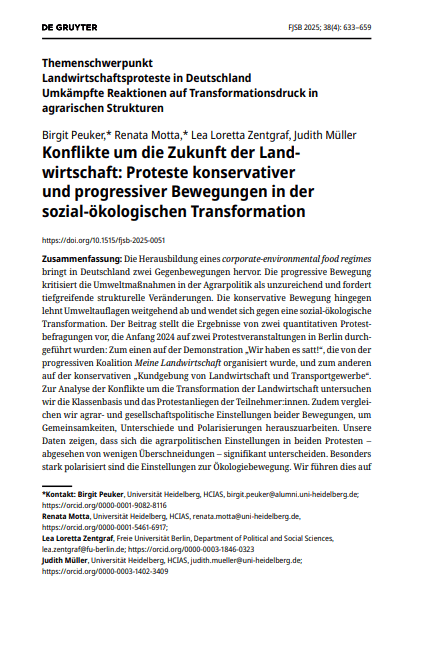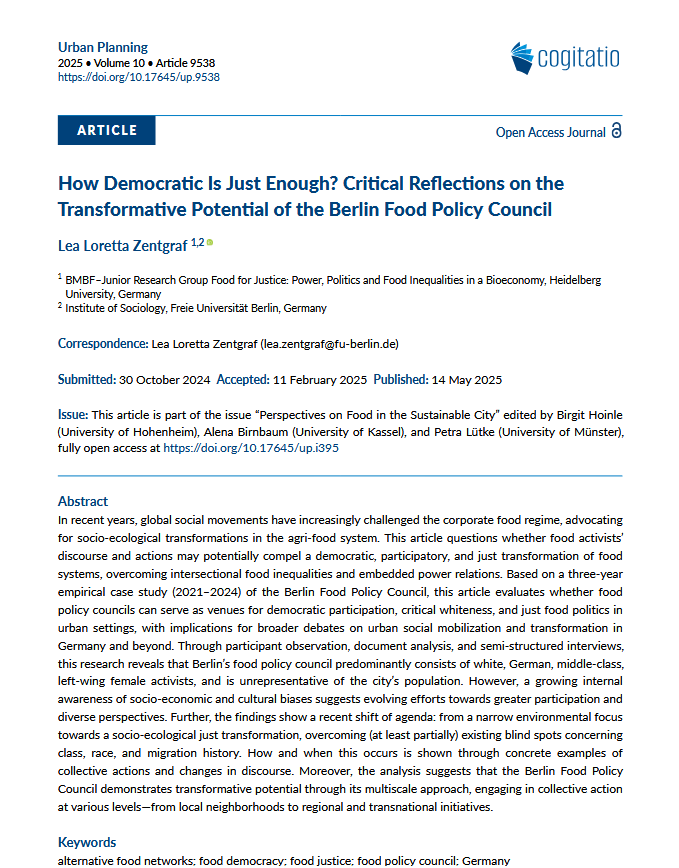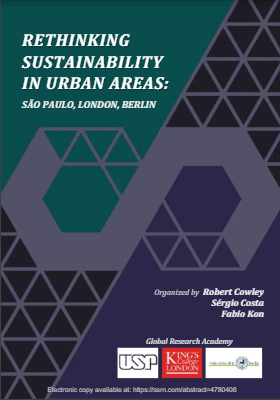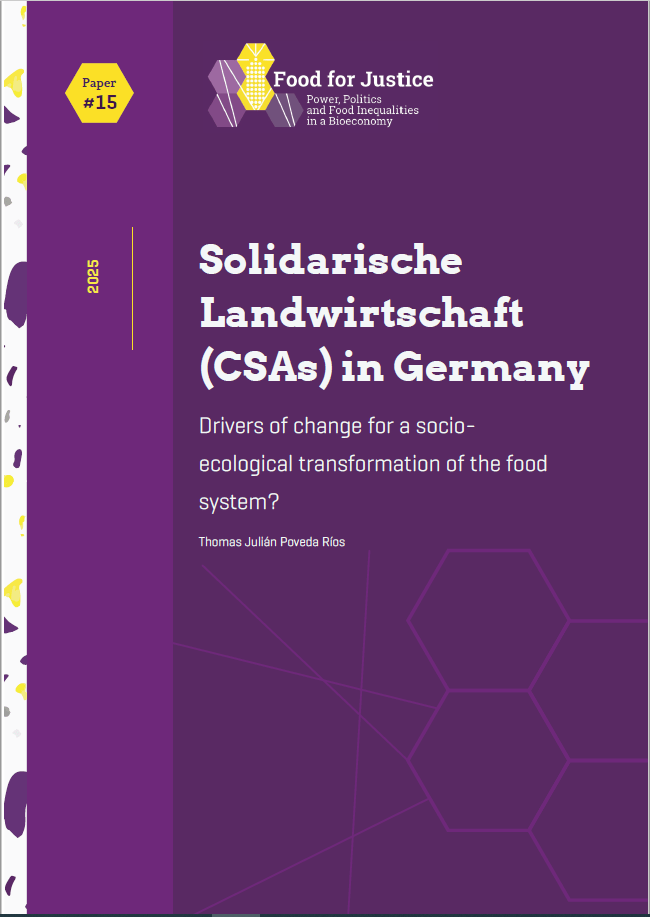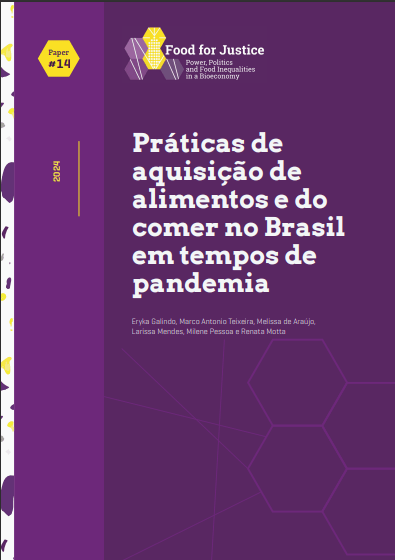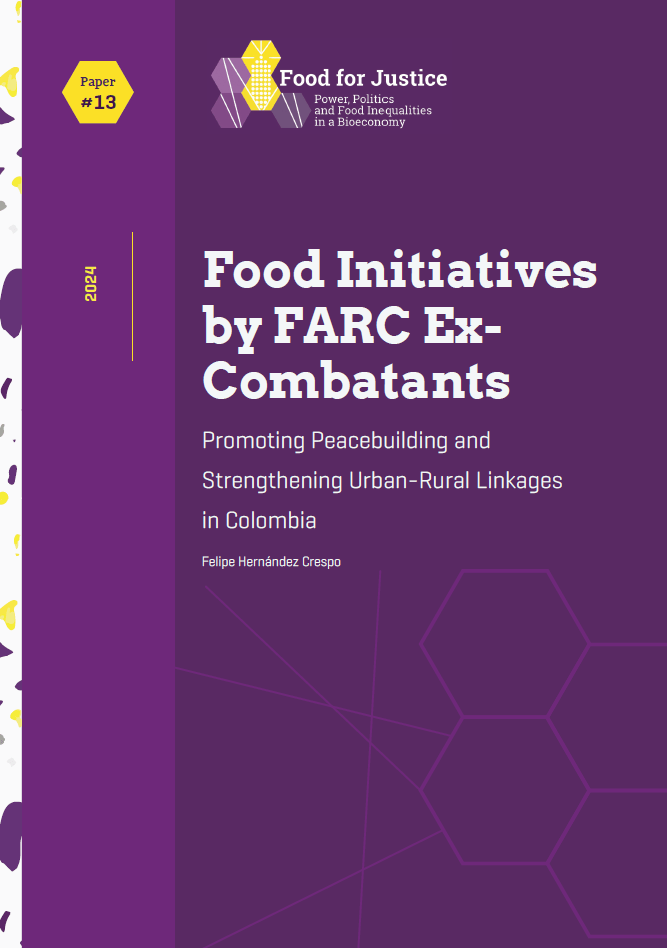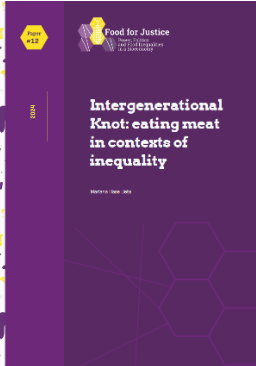Unsere Publikationen
[Transcript] • 2025
Politik der Lebensstile und Protest auf der »Wirhaben es satt!« DemonstrationReflexives Wissen in Agrar- und Ernährungsbewegungen
Abstract
Der Beitrag »Politik der Lebensstile und Protest auf der›Wir haben es satt!‹
Demonstration – reflexives Wissen in Agrar- und Ernährungsbewegungen«
von Birgit Peuker, Renata Motta, Judith Müller und Lea Loretta Zentgraf geht der
Frage nach, wie Protest gegen staatliche Politik und eine auf Änderung von
Alltagspraktiken ausgerichtete Politik der Lebensstile in der Protestbewegung
»Wir haben es satt!« verbunden sind. Ausgehend von der Diskussion um das
Verhältnis von »streitbarer Politik« und einer »Politik der Lebensstile« in der
Sozialen Bewegungsforschung und einem Fokus auf Ernährungspraktiken
werden Agrar- und Ernährungsbewegungen in Deutschland empirisch untersucht, wozu neben Dokumentenanalysen, teilnehmenden Beobachtungen
und qualitativen Interviews insbesondere eine quantitative Protestbefragung
der Demonstration »Wir haben es satt!« herangezogen werden. Ein zentrales Ergebnis der Untersuchung ist, dass die Verbindung der »Politik der
Lebensstile« und der politische Protest »Wir haben es satt!« dann überzeugt,
wenn Protestierende ihre politischen Forderungen für ein anderes Agrar- und
Ernährungssystem in ihren eigenen Alltagspraktiken umsetzen und hierfür
Wissen und Fertigkeiten entwickeln. Gleichzeitig können solch soziale Bewegungen wie »Meine Landwirtschaft« als »Lernorte« begriffen werden, denn
die Bewegung vermittelt Werte sozialer und ökologischer Gerechtigkeit, die
sie nutzt, um ihr eigenes Handeln, aber auch das der Politiker:innen und der
Unternehmer:innen zu bewerten.
Forschungsjournal Soziale Bewegungen • 2025
Konflikte um die Zukunft der Landwirtschaft: Proteste konservativerund progressiver Bewegungen in dersozial-ökologischen Transformation
Abstract
Die Herausbildung eines corporate-environmental food regimes
bringt in Deutschland zwei Gegenbewegungen hervor. Die progressive Bewegung
kritisiert die Umweltmaßnahmen in der Agrarpolitik als unzureichend und fordert
tiefgreifende strukturelle Veränderungen. Die konservative Bewegung hingegen
lehnt Umweltauflagen weitgehend ab und wendet sich gegen eine sozial-ökologische
Transformation. Der Beitrag stellt die Ergebnisse von zwei quantitativen Protestbefragungen vor, die Anfang 2024 auf zwei Protestveranstaltungen in Berlin durchgeführt wurden: Zum einen auf der Demonstration „Wir haben es satt!“, die von der
progressiven Koalition Meine Landwirtschaft organisiert wurde, und zum anderen
auf der konservativen „Kundgebung von Landwirtschaft und Transportgewerbe“.
Zur Analyse der Konflikte um die Transformation der Landwirtschaft untersuchen
wir die Klassenbasis und das Protestanliegen der Teilnehmer:innen. Zudem vergleichen wir agrar- und gesellschaftspolitische Einstellungen beider Bewegungen, um
Gemeinsamkeiten, Unterschiede und Polarisierungen herauszuarbeiten. Unsere
Daten zeigen, dass sich die agrarpolitischen Einstellungen in beiden Protesten –
abgesehen von wenigen Überschneidungen – signifikant unterscheiden. Besonders
stark polarisiert sind die Einstellungen zur Ökologiebewegung. Wir führen dies auf die unterschiedliche politische Ausrichtung der Proteste zurück. Die Politisierung
der Agrarfrage – so unsere Schlussfolgerung – erschwert eine Konsensbildung zur
Zukunft der Landwirtschaft. Zwar eint beide Bewegungen eine Kritik am corporate-environmental food regime, doch nur die progressive Bewegung formuliert eine
positive Vision einer agrar-ökologischen und sozial eingebetteten Landwirtschaft
der Zukunft.
2025
How Democratic Is Just Enough? Critical Reflections on theTransformative Potential of the Berlin Food Policy Council
Abstract
In recent years, global social movements have increasingly challenged the corporate food regime, advocating for socio‐ecological transformations in the agri‐food system. This article questions whether food activists’ discourse and actions may potentially compel a democratic, participatory, and just transformation of food systems, overcoming intersectional food inequalities and embedded power relations. Based on a three‐year empirical case study (2021–2024) of the Berlin Food Policy Council, this article evaluates whether food policy councils can serve as venues for democratic participation, critical whiteness, and just food politics in urban settings, with implications for broader debates on urban social mobilization and transformation in Germany and beyond. Through participant observation, document analysis, and semi‐structured interviews, this research reveals that Berlin’s food policy council predominantly consists of white, German, middle‐class, left‐wing female activists, and is unrepresentative of the city’s population. However, a growing internal awareness of socio‐economic and cultural biases suggests evolving efforts towards greater participation and diverse perspectives. Further, the findings show a recent shift of agenda: from a narrow environmental focus towards a socio‐ecological just transformation, overcoming (at least partially) existing blind spots concerning class, race, and migration history. How and when this occurs is shown through concrete examples of collective actions and changes in discourse. Moreover, the analysis suggests that the Berlin Food Policy Council demonstrates transformative potential through its multiscale approach, engaging in collective action at various levels—from local neighborhoods to regional and transnational initiatives.
Multidisciplinary Journal for Circular Economy and Sustainable Management of Residues • 2024
SUSTAINABLE INTERVENTIONS TO MANAGE RETAIL FOOD WASTE: A SCOPING REVIEW
Abstract
Der Artikel befasst sich mit der Lebensmittelverschwendung im Einzelhandel und ihren Auswirkungen auf die Wirtschaft, die Nachhaltigkeit, die Lebensmittelsicherheit und das Klima. Er stellt eine Übersichtsarbeit vor, die 43 Studien über Maßnahmen zur Reduzierung von Lebensmittelabfällen im Einzelhandel identifiziert und kategorisiert, die aus vier elektronischen Datenbanken entnommen wurden.
Die Untersuchung ergab 132 Maßnahmen in 41 Ländern, vor allem in Europa (73,2 %), wobei 86,4 % dieser Initiativen von Supermärkten durchgeführt wurden, die sich sowohl an Verbraucher*innen (50,8 %) als auch an ihre Betriebe (46,2 %) richteten. Die Maßnahmen wurden anhand einer Hierarchie der Lebensmittelverschwendung in sieben Kategorien eingeteilt, wobei der Schwerpunkt auf vorbeugenden Maßnahmen wie Sensibilisierungskampagnen, Preisnachlässen, betrieblichen Optimierungen, gesetzlichen Vorschriften und der Wiederverwendung von Lebensmitteln durch Spenden lag. Diese Strategien sind vielversprechend und sollten weiter erforscht werden, wobei bei etwa der Hälfte ihre ökologischen, sozialen und wirtschaftlichen Auswirkungen quantifiziert wurden.
Die Ergebnisse unterstreichen den Bedarf an verstärkten Forschungsinvestitionen im globalen Süden.
Rethinking sustainability in urban areas • 2024
Rethinking Sustainability in Urban Areas: São Paulo, London, Berlin
Abstract
Published in the book “Rethinking sustainability in urban areas” Lea Zentgraf contributed to the chapter “Sustainable Interventions to Manage Retail Food Waste in São Paulo and London” along with Ana Maria de Castro, Cézar Luquine Jr., Daniel Conde and Ribka Metaferia by addressing urban social and environmental issues like green space degradation, homelessness, and food waste. The research, part of the ‘Global Research Academy’ program, involved doctoral researchers from the University of São Paulo, Freie Universität Berlin, and King’s College London. The study took place in London, Berlin, and São Paulo, comparing these cities’ unique challenges and drawing recommendations for sustainability. The findings, supervised by Professors Fabio Kon, Sérgio Costa, and Dr. Robert Cowley, are available via the USP repository. The program was supported by international cooperation offices from the participating universities.
Springer link • 2024
Broadening the Climate Movement: The Marcha das Margaridas’ Agenda for the Climate (and Other) Crises
Abstract
Klimabewegungen, die von Studierenden und Jugendlichen auf der ganzen Welt (und insbesondere in den reicheren Volkswirtschaften) angeführt werden, haben anerkanntermaßen eine starke Stimme und leisten einen wichtigen Beitrag zu einem radikaleren gesellschaftlichen Wandel zur Bewältigung der Klimakrise. Es wird jedoch wenig über den Beitrag der Volksgruppen gesprochen, die sich seit Jahrzehnten mobilisieren und umfassendere strukturelle Veränderungen fordern – mit Vorschlägen, die sich mit Umweltfragen im Allgemeinen und der Klimakrise im Besonderen befassen -, die aber nicht direkt in klimapolitische Arenen wie die Klimakonferenzen der Vereinten Nationen eingebunden sind. In der Regel werden sie als verwundbar, als diejenigen, die am stärksten von den Klimaereignissen betroffen sind, als Opfer und Empfänger*innen von Anpassungsstrategien oder als widerstandsfähig dargestellt, aber nur selten erscheinen die Volkssektoren als Akteure der Transformation. Kritische Wissenschaftler*innen haben sich dafür ausgesprochen, die Klimakrise als Teil mehrerer Krisen zu verstehen, darunter die Krise der biologischen Vielfalt, eine Krise der Fürsorge und eine Krise der Demokratie. Indem wir unseren Artikel in diese Wissenschaft einordnen, argumentieren wir, dass die wissenschaftliche und gesellschaftliche Debatte über den Klimawandel von einer Erweiterung des Spektrums der sozialen Subjekte, die als Teil der Klimabewegung betrachtet werden, profitieren wird. Auf der Grundlage unserer Forschung mit ländlichen feministischen Volksbewegungen in Brasilien und insbesondere mit der Koalition Marcha das Margaridas gehen wir auf folgende Fragen ein: Wie sind ihre Diagnosen und Vorschläge zur Überwindung der Klimakrise in ihr breiteres Transformationsprojekt eingebettet? Und wie beeinflusst ihre politische Identität innerhalb von Klassen-, Geschlechter- und ländlichen Ungleichheitskategorien ihre Positionen?
Working Paper Serie
Working Paper 15 • 2025
Solidarische Landwirtschaft (CSAs) in Germany: Drivers of change for a socio-ecological transformation of the food system?
Abstract
In face of a multiple crisis within the current corporate food system, alternative models of food production and distribution have attracted increasing attention as catalysts for a socio-ecological transformation. Among these alternative models, Community Supported Agriculture (CSA) or as it is called in Germany, Solidarische Landwirtschaft (Solawi), emerges as a promising model for reshaping the socio-ecological landscape of food production and consumption. By shedding light on the transformative potentials and limitations of Solawis in the framework of a socio-ecological transformation of the local food system this paper aims to share knowledge and a further perspective on the question “How are we going to feed the world?”, the leading question of this working paper series. Through semi-structured expert interviews conducted in fall 2023 within two case studies around Berlin, the Apfeltraum Solawi and the Spörgelhof e.G. and a subsequent qualitative content analysis this work shares relevant insights across diverse domains of Solawi work, such as community-building, relationship with nature, fair wages and ecological farming practices.
Working paper 14 • 2024
Práticas de aquisição de alimentos e do comer no Brasil em tempos de pandemia
Abstract
The Covid-19 pandemic impacted social relationships, including dynamics associated with food practices. This study aims to identify and analyze changes in food purchasing and eating practices in Brazilian households in the first year of the pandemic. The analysis is based on data from a representative public opinion survey of Brazil conducted through telephone interviews between November 21 and December 19, 2020. The results indicate changes in food purchasing and eating practices, with a decrease in the frequency of leaving the house to buy food (68.9%) and to have meals outside the home, either at commercial establishments (74.4%) or at the homes of acquaintances (72.9%). These downward trends, motivated by social distancing recommendations to curb virus spread, vary depending on socio-economic markers, notably gender, race, income, and food security status. Regarding food purchasing practices, the digital environment became more widely used, either through online shopping or supermarket apps with home delivery (e-commerce) or through food delivery services. This trend was observed among both users already familiar with these channels and new adopters. On the other hand, open-air markets were less frequented by respondents for food purchases in the first year of the pandemic, with a 66.1% decrease in frequency among those who used these services before the pandemic. This change in food purchasing practices may lead, on the one hand, to greater exposure to ultra-processed foods and meals with unfavorable nutritional profiles, and, on the other, reduced access to channels for fresh and healthier food. Finally, this trend also reinforces food purchases from large supermarket chains while weakening small-scale vendors at open-air markets.
Working Paper 13 • 2024
Food Initiatives by FARC Ex-Combatants: Promoting Peacebuilding and Strengthening Urban-Rural Linkages in Colombia
Abstract
This working paper explores how food initiatives led by FARC ex-combatants contribute to peacebuilding and strengthen urban-rural linkages in Colombia. The study investigates the motivations behind ex-combatants‘ involvement in food initiatives, examines the connection between economic reincorporation and peacebuilding, and analyses how food acts as a bridge, materialising peace between urban and rural communities. Using a multi-method approach, this paper provides an overview of FARC’s political trajectory, highlighting its shift from armed insurgency to peacebuilding actor. It further maps the landscape of ex-combatant food initiatives, analysing their scale, organisational structures, roles within the food system, and the intersectional categories that shape them. Findings indicate that ex-combatants often view food-related projects as integral to economic reincorporation, motivated by a blend of campesino heritage, former guerrilla identity, and established regional production knowledge and practices. This combination emphasises the importance of urban-rural linkages in shaping collective reincorporation processes. These food initiatives, grounded in principles of territorial peace, align with broader peacebuilding efforts, aiming to strengthen urban-rural connectivity. Ultimately, this research underscores the critical role of food systems in building lasting peace and highlights the voices and agency of ex-combatants in shaping their futures.
Working Paper 12 • 2024
Intergenerational Knot: eating meat in contexts of inequality
Abstract
The Anthropocene is not only a period of rapid environmental transformation but also a prolific moment of values changes. While the temporality dimensions of this phenomenon are a challenge to social sciences inquiry, it also presents a great opportunity for new methodologies to emerge. The intergenerational knot can be a useful methodological frame for understanding social change through the discussion of different values across different generations because, at the same time, it evidences differences and disagreement; it also carries the potential of mutually influencing and multiplying new food consumption practices. The present article focuses on intergenerational discussions through the case study of meat consumption. The young generation analyzed usually prioritizes environmental impact when choosing what to eat, however, other factors exert more significant influence on the family food consumption, such as their experiences of food deprivation, their views of what a “better life” consists, and their experience of social mobility. Therefore, first-hand ethnographic data was collected from university students who negotiated between personal values and family narratives around their household meat consumption in Campinas, São Paulo, Brazil. The intergenerational knot becomes a useful methodological frame to understand values change in social and environmental transformation processes in an inclusive way.
Working Paper 11 • 2024
Food Movements in Germany. Analysis of actors in the socio-ecological transformation of the food system
Abstract
Around the world, social movements are protesting against the corporate food regime (Friedmann & McMichael, 1989), denouncing the injustices associated with its structural dynamics of neoliberal capitalism, patriarchal domination, racism, coloniality, epistemic violence, and anthropocentric exploitation (Motta, 2021b; Holt Giménez & Shattuck, 2011; Holt-Gimenez & Patel, 2012). Many food movements are calling for a socio-ecological transformation and creating alternative forms to produce, share, prepare, consume and dispose of food, based on relations of care, solidarity and respect. In their heterogeneity, they provide a good analytical lens to explore the multiple and intersectional dimensions of food inequalities denounced and the directions of change desired by organized movements from civil society (Motta, 2021a). But which are the food movements that mobilize for a socio-ecological transformation of food politics in Germany? What are the main dimensions and intersections of inequalities addressed by them?
Based on an explorative mapping, this research identifies relevant food movements in Germany, their discourses and agendas. It takes as units of analysis food movements organizations with considerable collective actions and participation in social mobilization on a national scale during the last 5 years (2018-2023). Using an analytical framework elaborated in dialogue with theoretical and conceptual works on food movements, food inequalities, and dynamics of transformation in the food regime, the empirical data is presented along the categories: types of movements and activist discourses, time of emergence, juridical form, dimensions of food inequalities addressed, categories of intersectional inequalities considered, spatial locus of action (urban/rural), phases of the food system, sphere of social change most frequently targeted by the food movements. Based on the data, the dynamics of transformations are discussed.
Applying a qualitative and quantitative methodology which combined content analysis and coding, the research results in a mapping of the actors (Mayring & Fenzl, 2019; Saldaña, 2021). This working paper aims to give a first overview of food activism in Germany by assessing the actors in this field of social mobilisation and analysing their emancipatory potentials and limits.
Working Paper 10 • 2024
Kurzauswertung Befragung „Wir haben es satt!“ 2024
Abstract
The large-scale protest “We’re Fed Up!” organized by the My agriculture alliance has been taking place every year since 2011 at the start of the Green Week agricultural trade fair in Berlin. The alliance campaigns for sustainable and fair agriculture and food production and calls for a turnaround in agriculture and nutrition. “We’re fed up!” is one of the central case studies of the BMBF junior research group Food for Justice: Power, Politics and Food Inequalities in a Bioeconomy at the Heidelberg Center for Ibero-American Studies, Heidelberg University. The project investigates different axes of food inequalities, in various scales and spatialities, and their dynamics of reproduction and change in food politics. The case study “We’re fed up!” explores the key justice demands that mobilize citizens to denounce food inequalities and call for alternative food policies in different regions of the world. On January 20, 2024, researchers from Food for Justice conducted a survey with participants in the “We’re fed up!” protest with the support of volunteer interviewers. The collected data provides insights on the demographics of the protesters, their concerns, political attitudes, and how they contribute to supporting a different approach to agriculture through their consumption and lifestyle choices. This brief summary presents the methods and selected results of the survey.






